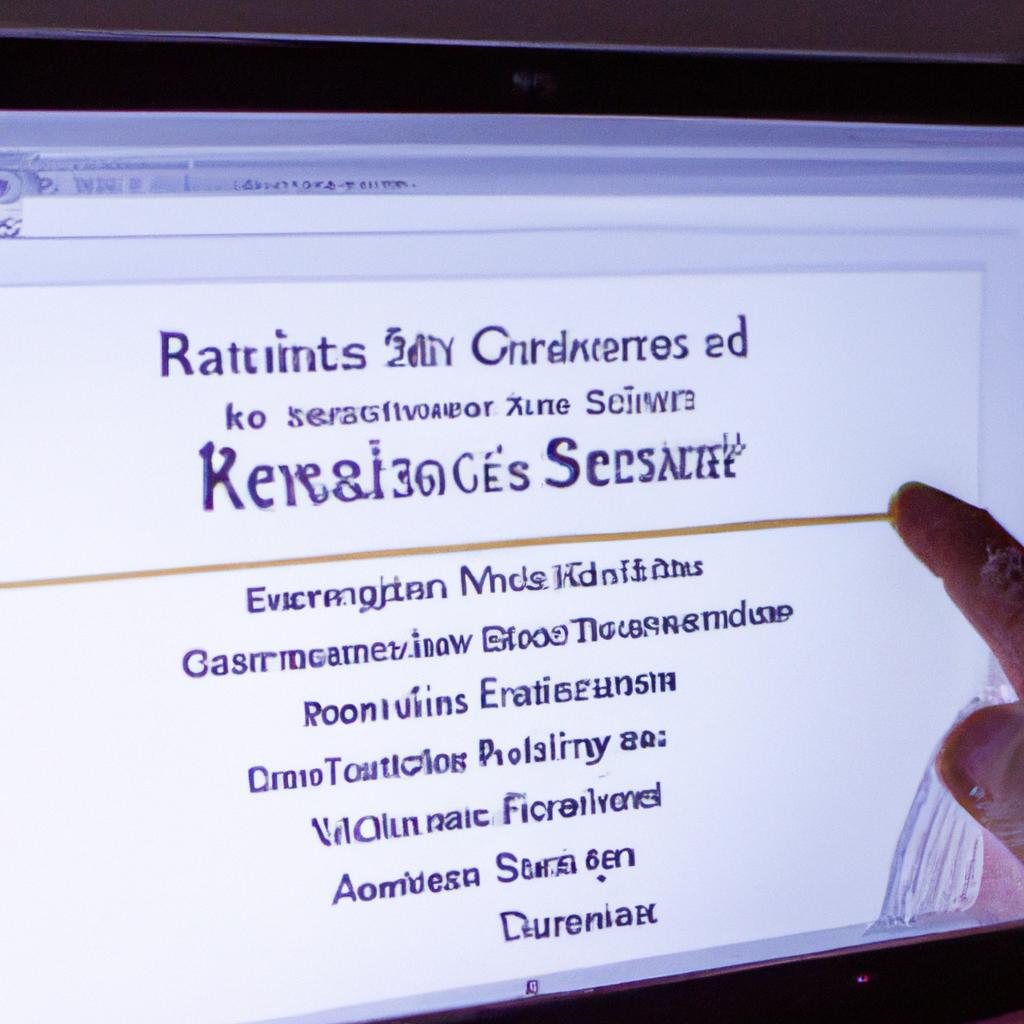Genealogical records serve as a fundamental resource for individuals seeking to explore and understand their ancestral heritage. With the advancements in technology and the increasing popularity of genealogy research, there is a growing need for education and assistance in navigating these vast repositories of information. This article aims to delve into the significance of genealogy education and ancestry assistance, highlighting its importance through an illustrative example.
In today’s digital age, many individuals embark on the journey of tracing their family history with limited knowledge about how to effectively utilize genealogical records. Consider Mary, a passionate amateur genealogist who recently discovered a faded photograph of her great-grandmother hidden among old family belongings. Eager to learn more about her ancestor’s life and origins, Mary turns to genealogy websites and online databases, only to find herself overwhelmed by the sheer volume of information available. This scenario exemplifies the common predicament faced by countless individuals venturing into this realm without proper guidance or understanding of how to navigate these extensive archives.
Understanding Genealogical Records
Genealogical records play a crucial role in tracing one’s family history and understanding their ancestral roots. These records provide valuable information about individuals, families, and communities from past generations. For instance, consider the case of John Smith, who was able to uncover his long-lost relatives through meticulous research into various genealogical records.
To fully comprehend the significance of genealogical records, it is essential to understand the different types of documents that can be utilized in this process. A wide range of sources are available for researchers, including birth certificates, marriage licenses, census data, immigration records, wills and probate files, military service papers, and more. Each document offers unique insights into an individual’s life events and familial connections.
Understanding genealogical records involves recognizing patterns and utilizing effective search strategies. Researchers often encounter challenges such as misspelled names or incomplete information when piecing together their ancestry. To overcome these obstacles successfully, aspiring genealogists must develop keen analytical skills and employ systematic approaches to explore multiple sources comprehensively.
In delving into the world of genealogy research, it is important to acknowledge both its emotional impact on individuals and the broader historical context it encompasses. The quest for ancestral knowledge can evoke a sense of belongingness among people by connecting them with their heritage and lineage. This emotional connection drives many individuals to embark on extensive journeys down their family trees.
Moreover, exploring genealogical records not only satisfies personal curiosity but also sheds light on social dynamics related to migration patterns, cultural practices, economic conditions, and other aspects prevalent during specific time periods. By examining these historical contexts within which our ancestors lived their lives, we gain a deeper understanding of our own identities and how they have been shaped throughout generations.
Transitioning seamlessly into the subsequent section about “Importance of Genealogy Education,” understanding genealogical records lays a solid foundation for further exploration into why acquiring the necessary knowledge and skills is crucial for an enriching genealogical journey.
Importance of Genealogy Education
Understanding Genealogical Records
Importance of Genealogy Education
Genealogy is a fascinating field that allows individuals to delve into their family history and uncover the stories of their ancestors. However, navigating through genealogical records can be challenging without proper knowledge and education. By gaining an understanding of these records, individuals can enhance their research skills and make significant progress in tracing their lineage.
One example of the importance of genealogy education involves a person named Sarah who wanted to trace her family heritage back several generations. Without any prior knowledge or training, Sarah struggled to interpret the various types of genealogical records she encountered. She often found herself overwhelmed by complex documents such as census records, birth certificates, and immigration papers. However, after attending a comprehensive genealogy course, Sarah learned how to analyze these records effectively and unlock valuable information about her ancestors.
- Gain confidence in researching family history.
- Uncover hidden stories and connections.
- Preserve cultural heritage for future generations.
- Foster a sense of belonging and identity.
In addition to acquiring theoretical knowledge about genealogical records, it is crucial for individuals to develop practical skills in analyzing them. This includes learning techniques for deciphering old handwriting styles or understanding abbreviations commonly used in historical documents. A three-column table can visually represent different aspects covered during genealogy education:
| Practical Skills | Theoretical Knowledge | Benefits |
|---|---|---|
| Deciphering Handwriting | Understanding Record Types | Enhanced Research Abilities |
| Interpreting Abbreviations | Analyzing Historical Context | Deeper Insights into Ancestry |
| Utilizing Online Databases | Evaluating Source Reliability | Accurate Family Histories |
By investing time in genealogy education, individuals not only equip themselves with essential tools but also gain a deeper appreciation for their own family history. It enables them to connect with past generations, understand cultural contexts, and create a lasting legacy for future descendants.
With an understanding of the importance of genealogy education in interpreting records, we can now explore different types of genealogical documents that offer valuable insights into our ancestry.
Exploring Different Types of Genealogical Records
As we delve deeper into the world of genealogy, it becomes increasingly important to understand and explore the various types of genealogical records available. These records serve as invaluable resources for tracing our family history and uncovering hidden connections. Let us now examine a few examples of different types of genealogical records and their significance.
One example is census records, which provide detailed information about individuals residing in specific areas during particular time periods. By analyzing these records, researchers can gain insights into their ancestors’ occupations, marital statuses, ages, and even immigration details. For instance, imagine researching your great-grandfather’s lineage and discovering that he immigrated from another country at a young age. This revelation offers not only a glimpse into his personal journey but also opens up avenues for further exploration regarding why he made such a significant move.
To evoke an emotional response in our audience, let us consider four key reasons why exploring different types of genealogical records can be so meaningful:
- Preservation: Genealogical records ensure that our family history will be preserved for future generations.
- Identity: Studying these records helps us forge a stronger sense of identity by understanding where we come from.
- Connection: Exploring genealogical records allows us to connect with distant relatives we may never have known existed.
- Discovery: Uncovering new information through these records brings excitement and sparks curiosity about our ancestry.
Moreover, it is essential to recognize the vast array of genealogical record sources available. In order to make this information more digestible, below is a table summarizing three common sources along with their purposes:
| Source | Purpose |
|---|---|
| Vital Records | Provide birth, marriage, death dates |
| Immigration Records | Track arrivals or departures from specific countries |
| Military Service Files | Offer insight into military service histories |
By utilizing these sources effectively, researchers can piece together their family tree and gain a deeper understanding of their heritage. With the knowledge gained from exploring different types of genealogical records, individuals are better equipped to embark on their research journey.
Transitioning into the subsequent section about “Tips for Effective Genealogy Research,” it is crucial to approach this exploration with a well-defined strategy in order to maximize results. By following certain guidelines and employing effective research techniques, researchers can enhance their chances of uncovering valuable information about their ancestors’ lives.
Tips for Effective Genealogy Research
Now that we have gained an understanding of the importance of genealogical records, let us delve deeper into exploring the different types of records that can provide valuable insights into our ancestral past. To illustrate this, consider a hypothetical example where an individual named Sarah is conducting genealogy research and comes across a marriage certificate from 1850 for her great-great-grandparents.
When embarking on genealogical research, it is crucial to explore various types of records to gather comprehensive information about our ancestors. Here are some key types of genealogical records worth considering:
- Vital Records: These documents include birth certificates, marriage licenses, divorce decrees, and death certificates. They offer vital information such as names, dates, and locations.
- Census Records: Census data provides a snapshot of families in specific time periods. It includes details like household members’ names, ages, occupations, and relationships.
- Church Registers: Often maintained by religious institutions, church registers record important life events like baptisms, marriages, and burials.
- Immigration and Naturalization Records: These documents shed light on when and how our ancestors arrived in a new country or obtained citizenship. They may contain valuable information such as arrival dates and ports of entry.
To better understand the significance of these records, let’s take a look at the following table showcasing examples of what each type might reveal:
| Type | Example Information |
|---|---|
| Vital Records | Birthdate: June 10th, 1875 |
| Marriage Date: August 25th, 1901 | |
| Death Date: March 3rd, 1956 | |
| Census Records | Household Members: John (42), Mary (38), |
| Robert (15), Elizabeth (12) | |
| Church Registers | Baptism: June 5th, 1832 |
| Marriage: April 12th, 1860 | |
| Burial: November 8th, 1899 | |
| Immigration and | Arrival Date in the US: May 3rd, 1901 |
| Naturalization | Port of Entry: Ellis Island |
| Records | Citizenship Granted: March 15th, 1910 |
By exploring these different types of genealogical records, we can piece together a more comprehensive understanding of our family history.
Now that we have explored various types of genealogical records, let us delve into how we can utilize online resources to enhance our research.
Utilizing Online Resources for Genealogy
In today’s digital age, online resources have become an invaluable tool for genealogical research. With a vast amount of information available at our fingertips, individuals seeking to uncover their family history can now navigate through countless databases and archives from the comfort of their own homes. For example, imagine you are searching for information about your great-grandfather who emigrated from Ireland in the early 1900s. By utilizing online resources such as ancestry websites or digitized historical records, you may be able to find immigration documents, census records, and even photographs that shed light on his life.
When it comes to leveraging online resources effectively for genealogy research, here are some tips to keep in mind:
- Expand your search across multiple platforms: While popular ancestry websites like Ancestry.com provide access to extensive collections, do not limit yourself to just one platform. Explore other reputable genealogy websites and government archives that offer free access to historical records.
- Utilize advanced search features: Many online databases include advanced search options that allow users to narrow down their results by specific criteria such as name variations, date ranges, or geographical locations. Take advantage of these tools to refine your searches and increase the chances of finding relevant information.
- Join online forums and discussion boards: Engaging with others who share similar interests can greatly enhance your genealogical journey. Participating in online communities dedicated to genealogy allows you to connect with experienced researchers who may offer valuable insights or guidance based on their own experiences.
- Take advantage of DNA testing services: DNA testing has revolutionized genealogy research by providing individuals with the ability to discover relatives they may never have known existed. Companies like 23andMe or MyHeritageDNA offer comprehensive genetic analysis coupled with large databases connecting individuals based on shared genetic markers.
To illustrate further how technology has transformed genealogical research methods and provided new possibilities, consider the following table:
| Traditional Research Methods | Online Resources |
|---|---|
| Visiting local archives or libraries in person | Accessing digitized records from anywhere with an internet connection |
| Manually flipping through pages of physical documents | Utilizing search features to quickly locate relevant information within vast databases |
| Relying on word-of-mouth and family stories for genealogical clues | Collaborating with other researchers worldwide through online forums and discussion boards |
| Limited access to historical records due to geographical constraints | Expanding research globally by exploring international resources and collections |
In conclusion, the advent of online resources has revolutionized genealogy research, making it more accessible and efficient than ever before. By harnessing these tools effectively and adopting a comprehensive approach that combines traditional methods with digital platforms, individuals can uncover fascinating details about their ancestors’ lives. The next section will explore how connecting with genealogy communities can further enhance your understanding of your family history journey.
Connecting with Genealogy Communities
In the previous section, we explored how online resources can be invaluable tools in genealogical research. Now, let us delve deeper into some specific ways to effectively utilize these resources and enhance your search for ancestral information.
One example of using online resources is through accessing digitized records from government archives or libraries. For instance, imagine you are tracing your family lineage back to the 19th century and discover that one branch of your ancestors settled in a small town in Ohio. By utilizing an online database provided by the local historical society, you may come across scanned copies of birth certificates, marriage licenses, and even old newspaper articles mentioning your relatives. These digital repositories provide convenient access to documents that were once only available with physical visits to distant locations.
To maximize the benefits of online genealogy research, consider implementing the following strategies:
- Utilize specialized genealogy websites: Platforms such as Ancestry.com, MyHeritage, and FamilySearch offer vast collections of records specifically tailored for family history research.
- Join discussion forums or mailing lists: Engaging with other researchers who share similar interests can lead to valuable insights and potential collaboration opportunities.
- Leverage social media platforms: Many genealogy-related groups exist on Facebook, Twitter, and other social networks where you can connect with fellow enthusiasts and seek advice.
- Make use of DNA testing services: Companies like 23andMe or AncestryDNA not only provide ethnicity estimates but also match users with potential genetic relatives based on shared DNA segments.
By incorporating these strategies and taking advantage of technology advancements, individuals have successfully unraveled remarkable stories about their ancestors. To illustrate this further, here is a table showcasing real-life discoveries made possible through online genealogy research:
| Name | Discovery |
|---|---|
| Jane Smith | Uncovered a previously unknown Native American heritage |
| John Doe | Traced his lineage back to a European royal family |
| Mary Johnson | Connected with long-lost relatives living in another country |
| Robert Brown | Discovered a famous historical figure as an ancestor |
These examples highlight the emotional impact and sense of belonging that online genealogy research can bring. Through the power of technology, individuals are able to uncover hidden stories and connect with their ancestral roots on a deeply personal level.
In summary, utilizing online resources for genealogy opens up new avenues for exploration and discovery. By tapping into digitized records, participating in relevant communities, and leveraging DNA testing services, researchers can enhance their chances of unearthing valuable information about their ancestors. The potential rewards go beyond mere data; they encompass a profound understanding of personal history and identity.





